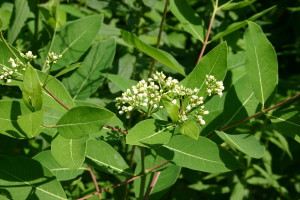Apocynum cannabinum is a herb. The root of Apocynum cannabinum is used for medicine.
Contents
Uses
The medicinal uses of Apocynum cannabinum:
It is also used in herbal medicine to treat fever, and dysentery. Although the toxins from the plant can cause nausea and catharsis, it has also been used for slowing the pulse, and it is also a sedative and mild hypnotic. It is an unpleasantly bitter stimulant irritant herb that acts on the heart, respiratory and urinary systems, and also on the uterus. Apocynum cannabinum was much employed by various Native American tribes who used it to treat a wide variety of complaints including rheumatism, coughs, pox, whooping cough, asthma, internal parasites, diarrhoea and also to increase milk flow in lactating mothers. The root has been used as a tonic, cardiotonic, diaphoretic, diuretic, emetic (induces vomitting) and expectorant. It is harvested in the autumn and dried for later use. The fresh root is the most active part medicinally. A weak tea made from the dried root has been used for cardiac diseases and also as a vermifuge (an agent that expels parasitic worms). The milky sap is a (presumably topically applied) folk remedy for venereal warts. The plant is still used in modern herbalism, though it should be used with great caution and only under the supervision of a qualified practitioner if taken internally.
Benefits
Despite serious safety concerns, Canadian hemp is used for arthritis, asthma, coughs, bloating, and syphilis. It is also used for heart problems including valvular insufficiency, “senile heart,” and weak heart muscles following pneumonia. Canadian hemp is also used to flush fluids out of the body by increasing urine flow.
Some people apply the fresh juice of Canadian hemp directly to the skin for warts.
Cautions
Apocynum cannabinum is UNSAFE to take by mouth because of its effects on the heart and other side effects.
Apocynum cannabinum is irritating to the throat, stomach, and intestines; and can cause nausea and vomiting. It can slow the rate of the heartbeat, which can cause the body to release substances that cause the blood pressure to increase.
Interactions
- Digoxin (Lanoxin) interacts with Apocynum cannabinum
Digoxin (Lanoxin) helps the heart beat more strongly. Canadian hemp also seems to affect the heart. Taking Canadian hemp along with digoxin can increase the effects of digoxin and increase the risk of side effects. Do not take Canadian hemp if you are taking digoxin (Lanoxin) without talking to your healthcare professional. - Water pills (Diuretic drugs) interacts with Apocynum cannabinum
Canadian hemp might affect the heart. “Water pills” can decrease potassium in the body. Low potassium levels can also affect the heart and increase the risk of side effects from Canadian hemp.
Some “water pills” that can deplete potassium include chlorothiazide (Diuril), chlorthalidone (Thalitone), furosemide (Lasix), hydrochlorothiazide (HCTZ, HydroDiuril, Microzide), and others.
Other names
Apocino del Canadá, Apocyn Chanvrin, Bitter Root, Canadian hemp, Cáñamo Canadiense, Cáñamo Indio, Catchfly, Chanvre Canadien, Chanvre du Canada, Chanvre Sauvage, Dogbane, Fly-Trap, Honeybloom, Indian-Hemp, Indian Physic, Milk Ipecac, Milkweed, Wallflower, Wild Cotton
References
Wikipedia, https://en.wikipedia.org/wiki/Apocynum_cannabinum#Uses

